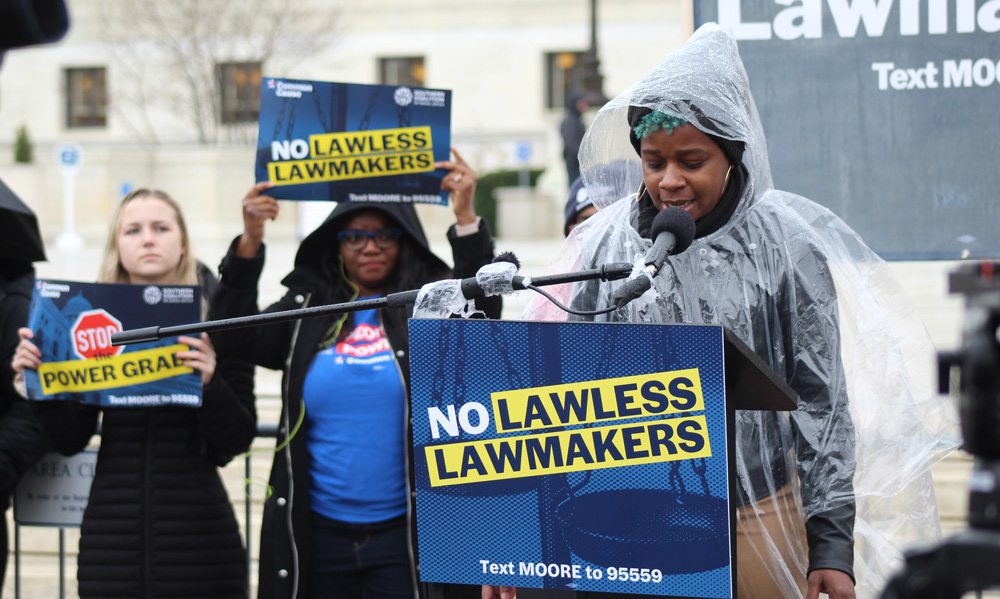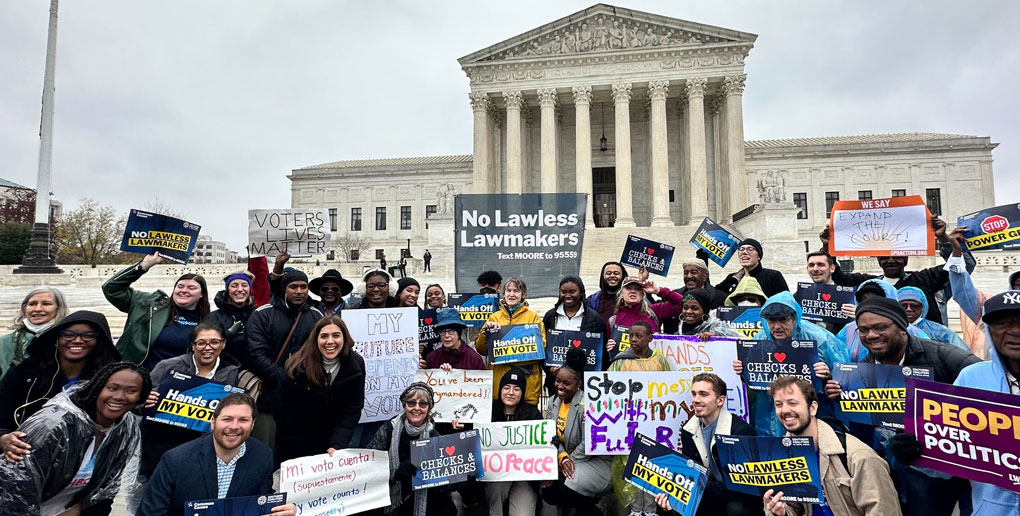Blog Post
VICTORY! U.S. Supreme Court stops power grab by NC politicians in historic Moore v. Harper ruling
Litigation

VICTORY! U.S. Supreme Court stops power grab by NC politicians in historic Moore v. Harper ruling
On June 27, 2023, the U.S. Supreme Court rejected a dangerous power grab by North Carolina politicians, issuing a historic pro-democracy ruling in our case of Moore v. Harper!
The U.S. Supreme Court issued an opinion in Moore v. Harper, holding that state legislatures “are bound by state constitutional restraints when exercising authority under the Elections Clause.” A worst-case ruling in this case would have handed partisan state lawmakers the power to manipulate our elections and undermine our votes.

Watch Common Cause’s National Redistricting Director Kathay Feng speak last December with Symone Sanders-Townsend on MSNBC about this high-stakes case.
On Wednesday, December 7, 2022, the Supreme Court of the United States heard oral arguments in Moore v. Harper. North Carolina Republican legislators are attempting a partisan power grab after the North Carolina Supreme Court struck down their illegal congressional gerrymander and adopted a map drawn by the Court’s special masters. The NC legislators argue that a radical legal concept, the so-called “independent state legislature theory,” allows them to manipulate congressional districts with no oversight from state courts. Read our press release here.
On December 13, 2021, Common Cause North Carolina, represented by Southern Coalition for Social Justice and Hogan Lovells, intervened in the consolidated cases of Harper v. Hall and League of Conservation Voters v. Hall. Specifically, we argued that the North Carolina Legislature’s process for drawing state legislative and Congressional voting maps ignored long-standing precedent and resulted in extreme partisan gerrymanders in violation of the North Carolina State Constitution. The motion to intervene challenged the Legislature’s maps themselves, alleging that state legislators crafted illegal partisan gerrymanders with devastating consequences for Black voters and their ability to elect the candidates of their choice.
On February 4, 2022, The North Carolina Supreme Court found that the House, Senate, and Congressional maps drawn by the NC General Assembly were unconstitutional partisan gerrymanders in violation of North Carolina law. The three-judge panel adopted the redrawn House and Senate maps and drew a new congressional map. The NC Supreme Court refused to stay implementation of the maps.
The Legislative Defendants then filed an Emergency Stay Application at the Supreme Court of the United States asking SCOTUS to stay the implementation of the new congressional map. We filed a brief in opposition arguing that this request is untimely, unnecessary, and would require SCOTUS to overturn decades of precedent and judicial process.
On March 7, 2022, U.S. Supreme Court rejected North Carolina lawmakers’ attempts to reinstate gerrymandered congressional maps.
On June 30, 2022, the Supreme Court granted certiorari in this case and heard oral arguments on December 7, 2022. We filed a brief opposing the historically baseless “independent state legislature theory” on October 19, 2022. Common Cause, alongside all other non-state respondents, argued that the constitutional text, structure, history, and precedent make clear that this theory must fail and the consequences of the “independent state legislature theory” would upend elections nationwide. Read our brief here.
Review both the previously invalidated and 2022 approved Congressional plans below.
Five Key Things to Know about the Case Six Reasons Why the ISL Theory Makes No Sense Highlighted Amicus Briefs
Supreme Court of the United States
NC Supreme Court Appeal on Remedial Maps
Superior Court Three-Judge Panel Remedy Stage
NC Supreme Court First Appeal
Superior Court Three-Judge Panel Trial
Blog Post
Blog Post
News Clip
News Clip
Press Release